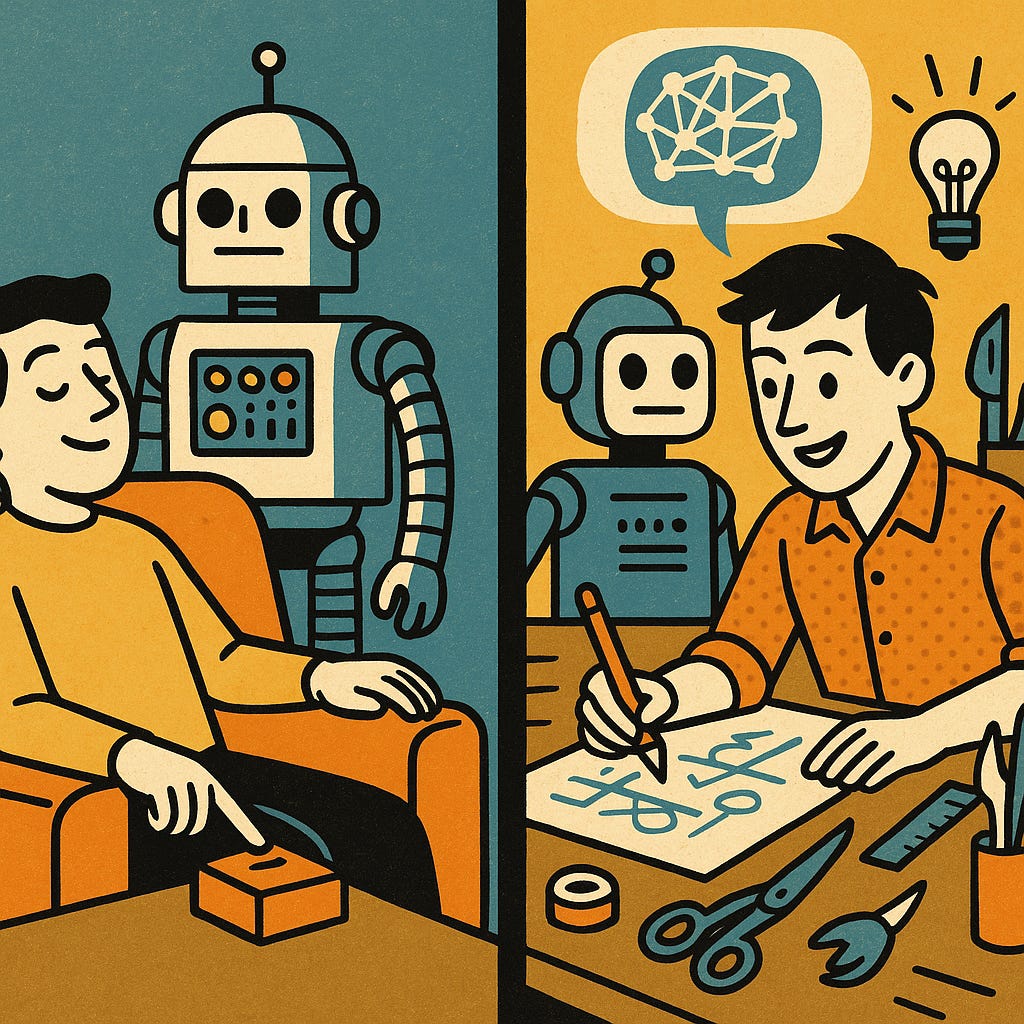Is AI a partner, a tool or a servant?
leaning back vs leaning in
I spent a few days this week talking to students at the University of Michigan, where I want to school. I do this every year. It’s good both to hear their perspective on life and tech, as well as force myself to see the world through their eyes as I explain it. It’s also helpful for me to remember the path I took to get where I am - it’s very easy to believe your own or other’s stories about yourself. It’s good to remember that the path wasn’t as straight as it seems looking backwards.
We talked a lot about AI, of course. One of the big topics was what skills to learn in the face of AI developments. I told the students the same thing I’ve been saying now: maker’s mind. Curiosity, persistence, grit, imagination are all what will count.
But why is that? It seems that there are two emerging perspectives on using AI (there are many perspectives on AI in general, but let’s talk here specifically about how people are trying to use it). You could probably break these down into people who treat AI as a servant or a tool?
A servant is something you lean back and direct. You give it (them) your intention and expect that intention to be satisfied without further interaction. When that intention is frustrated, you usually are annoyed - you expected the servant to do the job faithfully. Servants don’t necessarily have to be people - a vending machine is a kind of servant. Put in money, express intent, get stuff. If the stuff gets stuck (the servant fails to deliver), you’re mad! The contract is broken.
A tool is more like a partner (and maybe that’s a better word to use). With tools (or partners), we are interactive and iterative. We learn to use the tool properly (or to partner effectively), and we interactively work on a task together. If the tool is ineffective, we may use another tool, sharpen or otherwise modify it, or rethink our design or approach (or improve our own skills in using it).
With a servant, you lean back: you have no real agency, just the ability to direct. Most people seem to use AI this way: ask a question and hope for the best. The fear is that, eventually, AI will be able to “do everything” and there will be nothing for humans to do. I suppose, if the world is full of servants doing all tasks, and humans just lay around, that’s true. (c.f. WALL-E, or more or less any aristocratic class ever).
On the other hand, with a tool, and a maker’s mind, the world is open to you. The better your tool, and the better your skill with it, the more you can imagine and do. This is usually a feedback loop, for good makers: each achievement inspires more ambitious projects and explorations. Makers are by nature tinkerers and explorers, always looking for new things to try and to make. The compounding teams I mentioned last week are very much in the mindset of AI as a tool and are constantly tinkering with it and improving it. They’re getting incredible output as a result (and spending lots of money using it).
The world of AI is upon us, and just like the world of the internet, it will permeate and change almost everything we do. And just like the internet, you have choices about how you interact with it and consume it - some of them healthy and active (learning, building, diagnosing, educating), and some of them (I’m looking at you, social media and AI slop) not so much. But as always, what you get depends on the choice you make.
So…do you treat AI as a partner, a servant…or a tool?


I love this. When chatgpt 4 first came out, I definitely thought of it as a servant. But in the past year, I have come to relate to it in a much more dynamic way.
I use it to frame things differently than my default mode of thinking - to expand my mind outside of the reasonably narrow field I usually have. I use it to give me or highlight different contexts - not changing reality, just giving me a different shape of flashlight. I have used it to help me interpret my mom’s Alzheimer’s-related word salad, and I’ve used it to plan a backpacking trip to Catalina. It’s a collaborator.
This is a valuable perspective: "with a tool, and a maker’s mind, the world is open to you. The better your tool, and the better your skill with it, the more you can imagine and do. This is usually a feedback loop, for good makers: each achievement inspires more ambitious projects and explorations. Makers are by nature tinkerers and explorers, always looking for new things to try and to make. The compounding teams I mentioned last week are very much in the mindset of AI as a tool and are constantly tinkering with it and improving it."